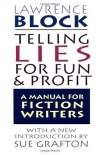Manual For Fiction Writers by Block, Lawrence (classic books to read .TXT) 📗

Book online «Manual For Fiction Writers by Block, Lawrence (classic books to read .TXT) 📗». Author Block, Lawrence
The writing went very well at the onset. In the first month I worked five or six days a week, wrote five or six pages a day, and completed the first section of the book, a chunk of one hundred thirty pages. Then I had to switch to a different viewpoint character and pick up the story at another time and in another place. I took a week off to give myself time to get out of the first character's head and into the second's. At the week's end I hurled myself once more into the breach and wrote every morning for three days, and on the fourth day I got up and realized I could not go on.
This realization has since become a way of life, repeated each morning with subtle variations. It would be nice if I were at least enjoying this non-writing time, but of course I'm not. I constantly beat myself up for it, accusing myself of self-indulgence and sloth, and that certainly doesn't help.
What does help is if I am able to regard this time off as a part of the creative process. I'm able to take that stance when I look at some of the time-outs I've called in the past.
Last fall, for example, I sat down on schedule and wrote the first sixty pages of the fourth Bernie Rhodenbarr mystery novel. Somewhere around page sixty I got the nagging feeling that something was wrong, although I had no idea what it might be, or what to do about it. I resolved this dilemma by lapsing into the sort of paralysis I'm in now, albeit of a different style. I was then able to avoid work without staying in bed, simply by setting up dates to resume work.
I'll get back to it after Thanksgiving, I told myself. Thanksgiving came and went, and I realized that I had the auction of the paperback rights of Ariel coming up in mid-December. Well, I'll wait until that's out of the way, I allowed. Who can work with all that hanging fire?
Who indeed? Not I, certainly. Once Ariel had gone under the hammer, the holidays were upon us. Who would initiate a project at such a time? Again, not I. I decided to get back to work when the new year started.
And I did. New Year's Day I took the subway clear to Riverdale to scout a location, one I did not wind up using in the book, as it turned out. And on January 2 I sat down at the typewriter and started the book over on page one, and I swear the thing flew. I wrote the whole book in five weeks flat and was delighted by the way it turned out. The prose flowed like water from a well. The plot evolved very neatly. All I had to do was show up each morning and type it out.
What this suggests to me is that the time I spent goofing off was not wasted time at all, that those two months away from the typewriter were somehow a part of the process of literary creation. I'm sure I could not have done as good a job on the book, or had as good a time with it, if I had forced myself to hammer away at it back in October.
Why, then, can't I regard this present period of inactivity as more of the same? After all, I did the first chunk of the book quickly and easily, and I'm pleased with how it turned out. (Or at least I was, until this current indolence led me to regard everything through mud-colored glasses.) It's not illogical to supposed that my subconscious needs time to gather its forces before springing forward again. I take substantial intervals between books without second thought. Might it not be equally important to take time off between the sections of a long book?
Of course it might. Furthermore, I've been going through a lot of personal aggravation during the last two months of a sort that could in and of itself throw one's literary productivity off-stride. Isn't it fair to assume that I'll be more capable of resuming work after this emotional ferment dies down a bit?
Of course it is.
I think the first step in getting through these dry periods is one of acceptance. I don't see how we do ourselves any good by beating ourselves up for our inability to fulfill our own excessive expectations. I can always devise a schedule for myself that I am incapable of carrying out. One's reach does exceed one's grasp, inevitably, and one's life never goes quite according to the script one has written for it, and thank God for that.
Acceptance is easier said than done, however. I can accept stretches of inactivity much more easily after they're over than while they're going on. Those months of not writing last fall?I can now regard myself as having made a brilliant decision, and I have to force myself to remember what a different view I took of it all at the time. It's a lot harder to see the picture when you're standing inside the frame. Once the writing is going well again I'll very likely see my current lethargy as having been valuable, but right now, even while I'm typing these lines, I have the ambivalent feelings of a Christian Scientist with appendicitis. I





Comments (0)